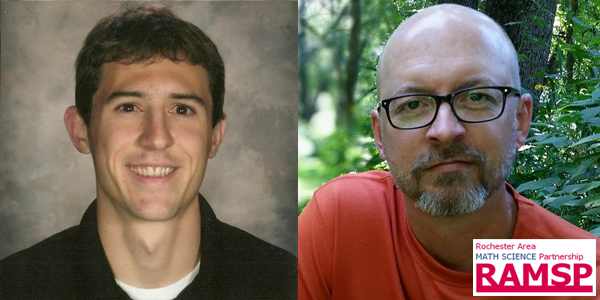
Andy Pethan & Paul Chick received the 2015 Rochester Area Math Science Partnership Outstanding Educator award.
Andy Pethan and Paul Chick received the 2014 Rochester Area Math Science Partnership’s (RAMSP) Outstanding Educator award on December 10, 2014.
The Rochester Area Math Science Partnership is a non-profit organization that supports and enhances area K-12 public and private school science and math (STEM) education through collaboration and offerings that benefit teachers, students, and our communities. RAMSP believes that all students must have a deep and substantive understanding of math, science, and technology in order to be productive members of society in the 21st century. RAMSP supports continuous improvement dedicated to all students achieving world-class standards in math, science and technology. Finally, RAMSP aims for high student achievement by providing leadership and support for continuous improvement with collaboration among school districts, businesses and higher education institutions.
Andy Pethan is a Mathematics teacher at Byron High School and completed WSU-Rochester’s Teacher Preparation Collaborative (TPC) program in 2012. In this program Pethan benefited from coaches that gave him the freedom to explore his own ideas while helping him reflect, using questions he would not have thought about on his own. Pethan has helped implement the “flipped classroom” approach utilized by the Byron Math Department and has created a game-based mathematics elective course, in addition Pethan is a robotics team coach.
Paul Chick is a dedicated high school physics and chemistry teacher at Plainview-Elgin-Millville High School in Plainview, MN. Paul graduated from WSU with a Bachelor of Science Teaching degree in Physics in 1993. He is a strong teacher advocate and negotiator, student advocate, and educational leader serving on several committees that oversee teacher evaluation, professional development, school improvement, curriculum, testing, Programs of Study and professional learning groups. He holds a BS in Physical Science Teaching, an MS in Education, and a licensure for PreK-12 principal, as well as licensure for district superintendent. Paul believes in a calm, servant leadership and teaching style focused on positive relationships with colleagues, students, parents and the community, while promoting innovation, creativity, technology, and forward thinking.
About the Winona State University College of Education
As the first teacher preparation school west of the Mississippi River and the first home of the National Education Association, the Winona State University College of Education has a long and storied history of innovation and leadership. The college enrollment, including all teacher education programs university-wide, is approximately 1,262 undergraduate students and 270 graduate students, supported by 40 full-time professors. With campuses in both Winona and Rochester, the College of Education is divided into seven departments and three centers, ranging from Early Childhood & Elementary Education to Counselor Education and Education Leadership. The college offers 22 Undergraduate Teacher Licensure programs, one Post-Baccalaureate Teacher Licensure program, 12 master’s programs, and three additional licensure and certificate programs. Initial licensure and advanced programs are accredited by the National Council for Accreditation of Teacher Education (NCATE) and the Minnesota Board of Teaching (BOT) and meet all standards accredited by the Council for Accreditation of Counseling and Related Education Programs (CACREP) and are recognized for state licensure in both school and community counseling. Educational Leadership is accredited by the Minnesota Board of School Administrators (BOSA). The WSU Children’s Center is accredited by the National Association of the Education of Young Children (NAEYC).
As the educational needs of communities throughout Minnesota continue to change, the College of Education will continue to respond. The Teach21 initiative, launched in 2009 and funded through a $4 million grant from the Bush Foundation, aims to transform WSU’s teacher preparation programs through a combined approach of targeted recruitment, effective training, specialized placement, and ongoing support. WSU’s Education Village initiative, which received initial funding during the 2013-14 Minnesota legislative session, is a bold, responsive plan to renovate existing campus facilities to offer integrated, flexible, state-of-the-art learning and teaching spaces, and provide future teachers with the preparation, support and inspiration they need to be successful in the 21st century classroom.
To learn more about the WSU College of Education visit: http://www.winona.edu/education/.
